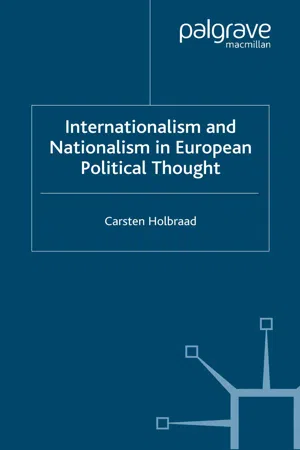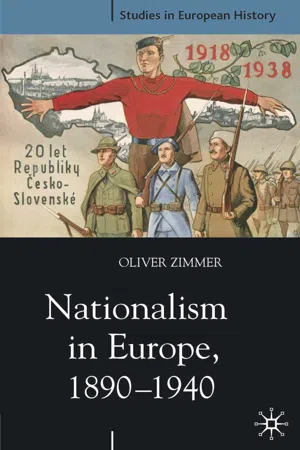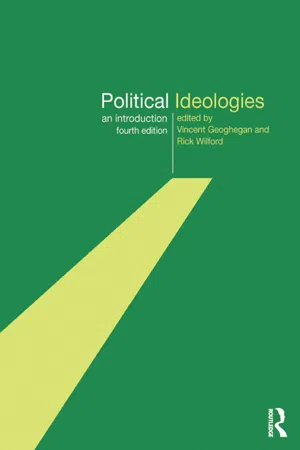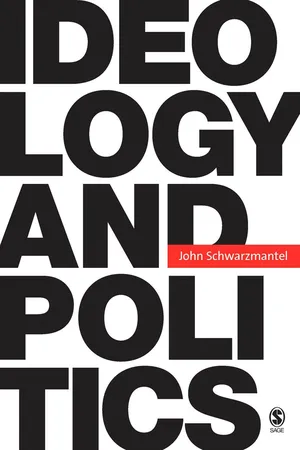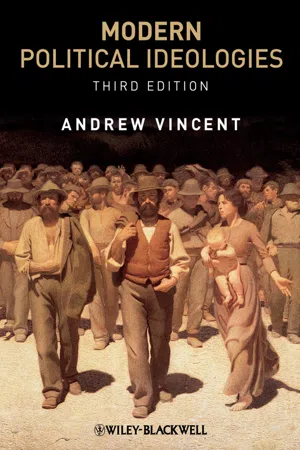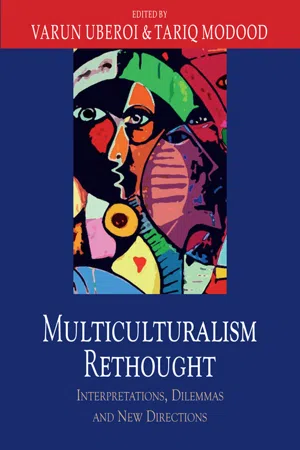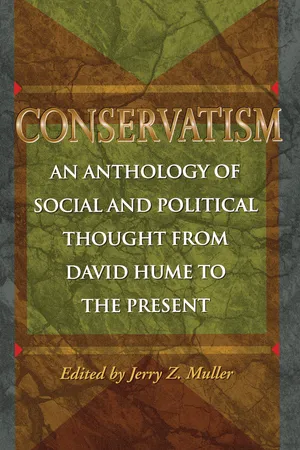Politics & International Relations
Conservative Nationalism
Conservative nationalism is a political ideology that emphasizes preserving traditional values, cultural identity, and national sovereignty. It often advocates for strong borders, limited immigration, and a focus on national interests over global cooperation. Conservative nationalists typically prioritize national security and economic protectionism while promoting a sense of national pride and unity.
Written by Perlego with AI-assistance
Related key terms
1 of 5
7 Key excerpts on "Conservative Nationalism"
- C. Holbraad(Author)
- 2003(Publication Date)
- Palgrave Macmillan(Publisher)
Wherever national pride did manifest itself in those years it was usu- ally for the limited purpose of restoring the state and reviving the national economy. Even when such goals had been achieved, most countries found few incentives to turn to any of the traditional kinds of Conservative Nationalism. The principal exceptions were the declining imperial powers, notably Britain and France but also smaller states with colonies left. On the right part of the political spectrum of such countries, a Conservative Nationalism asserted itself, the program of which was to oppose the anticolonial forces of what became known as the Third World and defend the traditional ideas and established possessions of empire. That form of nationalism survived for many years but gradually lost influence, in step with the growing strength and success of the anticolonial movement. In Britain, where decolonization had been undertaken with greater readiness than in France and Portugal, it lasted till well after that process had been largely completed. Remnants of the ideology might be detected in an underlying tendency to identify with Protestant Unionists against Catholic Republicans that often marked British involvement in the conflict in Northern Ireland from the 1970s. A remark- able upsurge of such nationalism in purer form took place in 1982, when a large section of public opinion passionately supported Thatcher’s decision to send the Navy to defend the Falkland Islands against Argentine invasion. Defensive Nationalism When Conservative Nationalism did recur in postwar Europe it was not so much a fruit of ideological tradition or a product of social and economic conditions as a reaction to the policies and pressures of the two superpowers. Conservative Nationalism ● 111 During most of the cold war the greatest obstacle to a revival of nationalism, particularly of the governmental kind, was the polarization of Europe between the Soviet Union and the United States.- eBook - PDF
- Oliver Zimmer(Author)
- 2017(Publication Date)
- Red Globe Press(Publisher)
5 Universalism Reconsidered: Nationalism and its Critics The explorations so far may have created the impression that national-ism was more or less irresistible. This impression is only partly accurate, particularly if we extend our chronological and geographical focus. This final chapter examines how conservative, liberal and socialist thinkers and movements perceived nationalism. This will reveal that the only political camp that opposed nationalism unreservedly was political conservatism. Liberals and socialists did not on the whole reject nation-alist doctrines but sought to integrate them into their own thought world. In practice, they attempted to accommodate nationalist arguments and use them to buttress their own political goals. Classic conservative critiques of nationalism Apart from the not very numerous cosmopolitans and anarchists of vari-ous forms, perhaps the most consistent critics of nationalism have been classic conservatives. One of the first and most powerful critics of nationalism was the great conservative thinker Edmund Burke. In his Reflections on the Revolution in France (1790) , Burke defended the English system against what he perceived as the dangerous new creed invented in revolutionary France. Against the positive emphasis on novelty and creation, Burke held the principles of inheritance and organic communal growth. According to Burke, states and the moral values and laws that sustained them, having evolved over centuries in accordance with the law of nature, ought not to be changed at will. These values and traditions defined ‘a partnership not only between those who are living, but between those who are living, those who are dead, and those who are to be born’ [Burke in 1: pp. 134–42]. Writing more than half a century after Burke’s reflections, Lord Acton formulated a similar 107 critique of modern nationalism. Turning his attention to the Habsburg Empire, Acton saw nationalism as a threat to the traditional legitimacy of the state. - eBook - ePub
Political Ideologies
An Introduction
- Robert Eccleshall, Vincent Geoghegan, Richard Jay, Michael Keeny, Ian MacKenzie, Richard Wilford, Vincent Geoghegan, Rick Wilford, Vincent Geoghegan, Rick Wilford(Authors)
- 2014(Publication Date)
- Routledge(Publisher)
These are claims about political fundamentals: how we are naturally; the relationship between this and political organization; the basis of governmental legitimacy. But while nationalism makes large and important claims about these essential elements of any serious political ideology, things seem to stop here. Nationalism outlines something about the structure and basis of political rule but does not say much about its content. There are still many questions about how to identify nations. For instance, what are the characteristics which specify nations? Language is an important way in which communities are distinguished, but nobody thinks that all the English-speaking people of the world should be one nation. People may claim to share a history or traditions, but the latter often turn out to be very recent inventions (see Hobsbawm and Ranger, 1992) and the former, history, is rarely free from disruption, population changes and all kinds of social transformation. Politicians often talk about the distinct values of a nation, but these are often not very distinct at all and almost always contested. Nor is it clear how the boundaries to a nation are fixed. Who is and is not included within one? What about different communities within a nation? And the claim that the only legitimate government is one which is attached to a nation says little about how exactly that government should be arranged. Must it be a single sovereign state or can it be legitimate for a nation to be part of a large multinational or federal state? Must it be a democracy or is a monarchy appropriate? These questions arise before we get to more specific issues: equality, property rights, economics, and so on.At this level it is not immediately clear that the propositions of nationalism distinguish it at all. The socialist critique of private property is something that cannot be shared by conservatism or liberalism and is thus one of the things that makes socialism a relatively distinct ideology. Similarly, the conservative defence of elitism cannot be shared by liberalism or socialism and makes conservatism relatively distinct. But conservatives and liberals need not find it difficult to endorse the view that nations are central to political organization. Socialists, even those keen to emphasize the importance of an international structure of class oppression and the need for universal liberation, have happily supported struggles for national independence and self-determination. Nationalism can be in contradiction with socialism or conservatism, but it doesn’t seem to be the case that it is necessarily so. What, then, is distinctive about nationalism?Because of the generality of the claims of nationalism, the political theorist Michael Freeden calls it a ‘thin’ ideology: it offers an outline of how politics should work but doesn’t add any of the necessary layers. Each core concept of nationalism, he explains: - eBook - ePub
- John Schwarzmantel, Author(Authors)
- 2008(Publication Date)
- SAGE Publications Ltd(Publisher)
What, then, does this all mean for the future of conservatism as a ‘living’ political ideology able to inspire political action? Conservatism as an intellectual doctrine has traditionally been sceptical of large-scale change and attempts at social engineering, whether on the international or the national level. In a recent essay the conservative thinker Roger Scruton suggests that conservatism of this nature could link up with ideas of ‘conservation’. Conservatism and ecologism could form a fruitful alliance to provide the motivation that Burkean ideas of hierarchy can no longer establish. Scruton appeals to ‘a more open-minded and imaginative vision of what conservatism and environmentalism have to offer each other’ since ‘nobody seems to have identified a motive more likely to serve the environmentalist cause than this one, of the shared love for our home’ (Scruton, 2006: 19). Scruton rejects environmentalism as articulated by activist global pressure groups, seeing these as unaccountable and unrepresentative. He calls for a mutual understanding between conservatives and environmental ‘conservationists’. This has to be based on a defence of the nation, retreating ‘from the global back to the local’ so that conservatism, nationalism and environmentalism can be linked in an alliance which takes account of intergenerational solidarity and passing things on to one’s descendants. The obvious criticism is that if the environmental problems themselves transcend the local or the national, then focusing on defending one’s ‘home’ (nation) will not lead to an adequate grasp of these problems.More generally it can be said that conservatism as a living ideology has itself fragmented into a set of distinct concerns held by increasingly separate bodies of thought. The deeply rooted concern for community and social cohesion has been taken up by several lines of thought going well beyond the traditional Right into varieties of communitarian ideology. The concern with the free market expressed by ‘new Right’ ideologies takes conservatism away from its traditional concerns. It looks increasingly threadbare in a world faced with problems that require government action, and a degree of citizen solidarity to tackle such problems as cohesion across different religious, ethnic and cultural communities, or the more general question of disaffected members of particular communities turning to extremist politics. One journalist writing about the current British Conservative Party and its present leader (at the time of writing), David Cameron, argues that ‘Cameron knows that Britain is now a social-democratic country. Only a catastrophe will make it anything else in the foreseeable future. He must adopt a social-democratic agenda to win an election, and he will certainly lose it if he embraces an old Conservative one’ (Hastings, 2006: 30). - eBook - PDF
- Andrew Vincent(Author)
- 2009(Publication Date)
- Wiley-Blackwell(Publisher)
However, integral nationalism, unlike liberal nationalism, was self-consciously imperialistic, illiberal, irrationalist and militaristic and was often premised on the superiority of particular peoples or nations. In other words, integral nationalism was premised upon a hierarchical understanding of nations. As in most ideologies, certain formal regulative ideas can be identified within nationalism. Various schools of nationalism interpret these ideas differently. Formally, nationalism asserts that the world is divided into distinct nations, each with its own historical continuity, language, beliefs, symbols and destiny (see Smith 2001, 9ff). The nation is seen to be deeply rooted in the past. It is the source of political and social power and can only be fulfilled when embodied in a state. Nationhood is also commonly identified with a territory with identifiable boundaries. Each nation pur-ports to have its own distinctive customs, traditions, folklore and symbols which structure the basis of its solidarity. Religion can be a force within nationalism – Poland, the USA or Iran, for example, would be difficult to understand without religious categories entering somewhere into the national equation – but this is by no means always the case. 24 The nation also becomes the political and moral sovereign, and thus the ultimate ground of legitimacy and loyalty. Loyalty to the nation tends to override other allegiances, although this varies with the type of nationalism. Human beings must identify with their nation if they wish to be free and realize themselves. The idea of nationalism can give rise to the ideas of equality and frater-nity among nationals, although these ideas are more immediately prevalent in liberal nationalism. Finally, nations must be free, independent and secure from external threat if peace and justice are to prevail in the international order. - eBook - PDF
Multiculturalism Rethought
Interpretations, Dilemmas and New Directions
- Varun Uberoi, Tariq Modood(Authors)
- 2015(Publication Date)
- Edinburgh University Press(Publisher)
This is also true of Jürgen Habermas who seeks to substitute ideas of nationhood with his own ideas 8 and Maurizio Viroli, Martha Nussbaum and Seyla Benhabib who do the same but using older traditions of politi-cal thought, such as republican patriotism or cosmopolitan-ism. 9 Instead, those examining how national identities should be conceived, given importance and related to other ideas of nationhood are political theorists who are often referred to as ‘conservative nationalists’, like Roger Scruton, 10 or ‘liberal nationalists’, like David Miller and Yael Tamir. 11 I will thus distinguish Parekh’s ways of thinking about national identities from those of conservative and liberal nationalists. But these two types of thinkers will be shown to address the same subject as Parekh so differently that distinguishing their ideas from his requires no detailed exegesis of conservative and liberal nation-alist works. And for this reason, I need say only a little to intro-duce such nationalist thinkers here. The presuppositions, philosophical approaches, arguments and thus political positions of each conservative and liberal national-ist thinker usually differ. But as we might expect, such thinkers usually refer to themselves as conservatives or liberals and these traditions of thought shape how they think about ideas of nation-hood. 12 For example, the Burkean idea of polities being a ‘part-nership’ between the living, the dead and the unborn 13 shapes the way a conservative like Scruton understands nations, as he describes them not only as those who share territory, history, and institutions, but descent and fate too. 14 Likewise, the liberal ideal that comes from Kant, J. S. Mill and others of an individual who ‘chooses’ his life ‘plan for himself’ 15 makes Ernest Renan’s notion of nations constituted by ‘consent’ and a ‘ desire to live a common life’ 16 attractive to liberals like Miller or Tamir who endorse it. 17 - eBook - PDF
Conservatism
An Anthology of Social and Political Thought from David Hume to the Present
- Jerry Z. Muller(Author)
- 2020(Publication Date)
- Princeton University Press(Publisher)
INTRODUCTION • WHAT IS CONSERVATIVE SOCIAL AND POLITICAL THOUGHT? An intuitive procedure for defining conservatism is to begin by listing the institutions which conservatives have sought to conserve. That will not get us very far. For conservatives have, at one time and place or an-other, defended royal power, constitutional monarchy, aristocratic pre-rogative, representative democracy, and presidential dictatorship; high tariffs and free trade; nationalism and internationalism; centralism and federalism; a society of inherited estates, a capitalist, market society, and one or another version of the welfare state. They have defended religion in general, established churches, and the need for government to defend itself against the claims of religious enthusiasts. There are, no doubt, self-described conservatives today who cannot imagine that conserva-tives could defend institutions and practices other than those they hold dear. Yet they might find, to their surprise, that conservatives in their own national past have defended institutions which contemporary con-servatives abhor. And were they to look beyond their own national bor-ders, they might find that some of the institutions and practices they seek to conserve are regarded as implausible or risible by their conserva-tive counterparts in other nations. In one of the most perceptive scholarly analyses of the subject, Samuel Huntington argued that conservatism is best understood not as an inherent theory in defense of particular institutions, but as a positional ideology. When the foundations of society are threatened, the conser-vative ideology reminds men of the necessity of some institutions and the desirability of the existing ones, Huntington suggested. 1 Rather than representing the self-satisfied and complacent acceptance of the in-stitutional status quo, ideological conservatism arises from the anxiety that valuable institutions are endangered by contemporary develop-ments or by proposed reforms.
Index pages curate the most relevant extracts from our library of academic textbooks. They’ve been created using an in-house natural language model (NLM), each adding context and meaning to key research topics.
